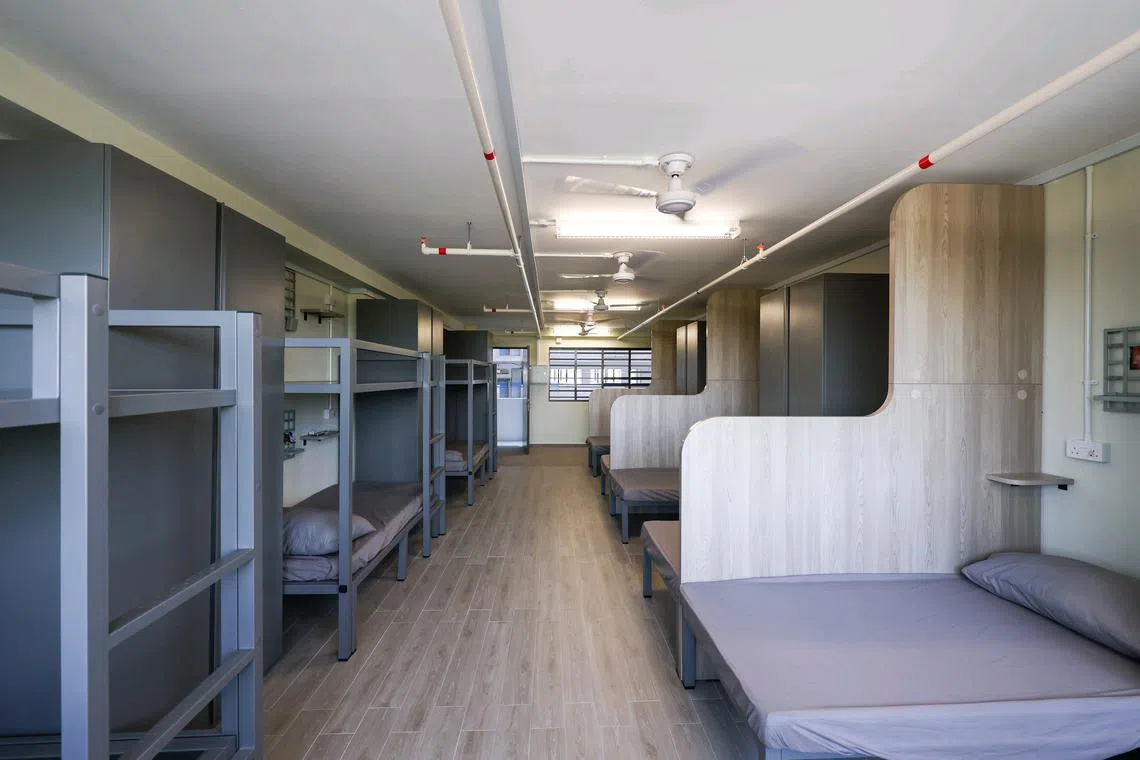6 foreign worker dorms with total capacity of 45,000 beds to be built in next few years
Sign up now: Get ST's newsletters delivered to your inbox

Senior Minister of State for Manpower Koh Poh Koon said that the Government has been working closely with the dormitory industry to increase the supply of beds
ST PHOTO: BRIAN TEO
Follow topic:
SINGAPORE – Six new dormitories for workers, with a combined capacity of around 45,000 beds, will be built over the next few years, said Senior Minister of State for Manpower Koh Poh Koon on April 8.
These include the Ministry of Manpower’s (MOM) new 2,400-worker dormitory in Jalan Tukang that is set to open in early 2026.
Dr Koh was responding to a question by Mr Yip Hon Weng (Yio Chu Kang) in Parliament on the ministry’s long-term strategy to ensure sufficient and resilient housing for foreign workers.
MOM said the relevant agencies will announce the locations of the other five new dormitories when ready.
Based on ST’s checks, a new dormitory named Pioneer Lodge is being constructed in Soon Lee Road. A post by construction and property group Wee Hur Holdings on property portal EdgeProp.sg shows that Pioneer Lodge can accommodate up to 10,500 workers once it is completed in October 2025.
Dr Koh’s comments on April 8 came on the back of the closure in April of two Sembawang dormitories
The bed crunch has left firms scrambling to find alternative accommodation for their workers by the end of April, before both dorms are demolished to make way for a new housing estate.
Adding that the Government has been working closely with the dormitory operators to increase the supply of beds, Dr Koh said this includes extending the expiring leases of dormitories where possible and allowing existing dormitories with excess space to increase their occupancy while meeting current dormitory housing standards.
Besides those measures, Dr Koh said the ministry has been speeding up and facilitating applications for new dormitories created by converting factory space, and for temporary workers’ quarters to expand its supply of beds.
While the Government has put in measures to increase the supply of beds, he added that this will not be sustainable if the demand for work permit holders grows continuously.
Dr Koh urged employers to adopt productivity measures, so they would be less reliant on migrant workers. These measures include investing in technology to reduce the manpower needed or upskilling workers to raise productivity levels.
Mr Yip then asked how MOM would strike a balance between safeguarding workers’ welfare and avoiding excessive costs for businesses. He also asked the ministry about its efforts to roll out regulatory upgrades in a cost-effective and phased manner.
These regulatory upgrades refer to the higher standards of living that must be applied across all new dormitories, as announced by MOM in 2021.
The majority of existing dorms would need to progressively meet interim housing standards
By 2030, about 1,000 foreign worker dormitories must meet these interim standards.
The interim standards include a limit of 12 residents per room, mandatory en-suite toilets and a minimum of 3.6 sq m – compared with 4.2 sq m in the standards announced in 2021 – of living space per resident.
Addressing Mr Yip’s follow-up questions, Dr Koh said this dorm transition plan is a phased approach that ensures there are enough available beds for the highest possible number of workers at any point in time.
Therefore, the transition of existing dormitories to ones that adhere to these new living standards will be carried out gradually to ensure that there is no shortage in supply, he added.
He noted that there will be an increase in the supply of beds with the construction of six new dormitories.
Describing the transition as a progressive approach, Dr Koh said the ministry is in close contact with the Dormitory Association of Singapore to hear from industry players. The ministry is also reaching out, via the association, to inform employers that may need bed space for their workers about spare bed spaces in other dormitories as there are matching efforts that take place at the industry level.
“With that, I think we can transit to the desired dorm standards over time without impacting too much of a dorm supply.
“Over time, as the supply and demand balance is achieved, we will see dorm prices actually stabilising. In fact, that has been the case over the past year,” said Dr Koh.
Correction note: In an earlier version of the story, we said that Mr Zaqy Mohamad was addressing the parliamentary question. This is incorrect. It should be Dr Koh Poh Koon.
Additional reporting by Wong Yang


